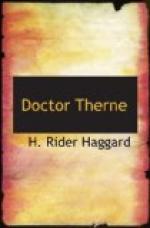It was very evident that the jury found a difficulty in making up their minds, for minute after minute went by and still they did not return. Indeed, they must have been absent quite an hour and a half when suddenly the superintendent of police removed the chair which he had given me and informed me that “they” were coming.
With a curious and impersonal emotion, as a man might consider a case in which he had no immediate concern, I studied their faces while one by one they filed into the box. The anxiety had been so great and so prolonged that I rejoiced it was at length coming to its end, whatever that end might be.
The judge having returned to his seat on the bench, in the midst of the most intense silence the clerk asked the jury whether they found the prisoner guilty or not guilty. Rising to his feet, the foreman, a dapper little man with a rapid utterance, said, or rather read from a piece of paper, “Not guilty, but we hope that in future Dr. Therne will be more careful about conveying infection.”
“That is a most improper verdict,” broke in the judge with irritation, “for it acquits the accused and yet implies that he is guilty. Dr. Therne, you are discharged. I repeat that I regret that the jury should have thought fit to add a very uncalled-for rider to their verdict.”
I left the dock and pushed my way through the crowd. Outside the court-house I came face to face with Sir Thomas Colford. A sudden impulse moved me to speak to him.
“Sir Thomas,” I began, “now that I have been acquitted by a jury——”
“Pray, Dr. Therne,” he broke in, “say no more, for the less said the better. It is useless to offer explanations to a man whose wife you have murdered.”
“But, Sir Thomas, that is false. When I visited Lady Colford I knew nothing of my wife’s condition.”
“Sir,” he replied, “in this matter I have to choose between the word of Sir John Bell, who, although unfortunately my wife did not like him as a doctor, has been my friend for over twenty years, and your word, with whom I have been acquainted for one year. Under these circumstances, I believe Sir John Bell, and that you are a guilty man. Nine people out of every ten in Dunchester believe this, and, what is more, the jury believed it also, although for reasons which are easily to be understood they showed mercy to you,” and, turning on his heel, he walked away from me.
I also walked away to my own desolate home, and, sitting down in the empty consulting-room, contemplated the utter ruin that had overtaken me. My wife was gone and my career was gone, and to whatever part of the earth I might migrate an evil reputation would follow me. And all this through no fault of mine.
Whilst I still sat brooding a man was shown into the room, a smiling little black-coated person, in whom I recognised the managing clerk of the firm of solicitors that had conducted the case for the prosecution.




